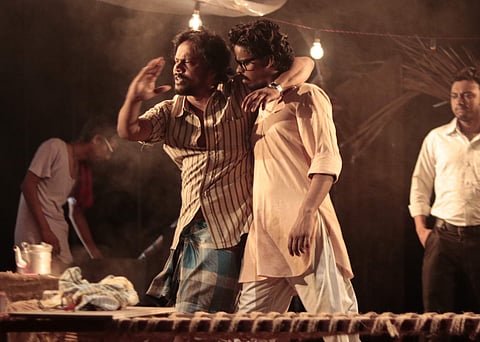
- LIFESTYLE
- FASHION
- FOOD
- ENTERTAINMENT
- EVENTS
- CULTURE
- VIDEOS
- WEB STORIES
- GALLERIES
- GADGETS
- CAR & BIKE
- SOCIETY
- TRAVEL
- NORTH EAST
- INDULGE CONNECT

SAURAV Palodhi, the driving force behind the Ichheymoto theatre troupe, is set to present a vivid manifesto based on the lives of working-class people this week, with an adaptation of Utpal Dutt’s greatly admired play, Ghum Nei.
The original play, written by Utpal Dutt, echoed the political unrest and Workers’ Union strikes of the 1970s. Palodhi’s version, meanwhile, takes place on the Behrampore-Kolkata Highway in the same timescape, while telling a story about the masses, who struggle under the dictatorship of the ruling class.
“This is the first time that I am adapting an Utpal Dutt play, and I have always admired his writings and political ideology. He wrote this play and staged it at a time when the Congress was in power, without bothering about the consequences,” reveals Saurav, about his directorial approach.
There are as many as 17 characters in the play, including truck drivers, a dhaba owner, a madman, an unemployed man, an elderly gent, and two reporters looking for a story, among others — all of who play out the plight of people on whom the economy is said to rest, but who generally go unnoticed, and ignored. “We tried to keep the timescape the same as in Dutt’s play. But we have made a few changes in music and dialogues. Despite the story taking place in 1974-’75, you will find references that are still relevant,” offers Saurav.
“The main motto of Utpal Dutt’s play was that the political scenario should change, and workers should get the baton. My interpretation is not too different either, but we have chosen not to name any political parties. Our moot point is that the corporate sector should not make obsolete our farmers or daily labourers,” he explains.
Saurav goes onto explain, “It was very challenging to stage this play, primarily because of the language used by the workers. We, who belong to the elite class, will find the language particularly jarring, for the use of loose words,” he cautions, adding, “That is why I have chosen to call it Ekti Chotolokder Natok, as a gag line in all the publicity and promotions of the play.
There will be some live songs too, sung by the actors on stage, in the manner of Dhopkirtan, where the characters will sing a parody of Ekla Cholo Re and other songs, using utensils for music, and slang instead of proper words.
“When Utpal Dutt staged his plays, he was threatened by goons several times, and his plays also got banned, but nothing deterred him. He is not just my inspiration, but my courage,” shares Saurav, who is also working on an as-yet-unnamed Bengali feature film, which is expected in August. As for this production, the lighting has been designed by Soumen Chakraborty, costumes and sets have all been worked on by the Ichheymoto team, while the music has been composed by Debdeep Mukherjee.
At The Academy of Fine Arts. On May 10, 6.30 pm